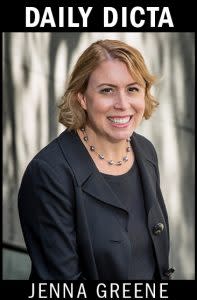Daily Dicta: For Cravath’s Evan Chesler, the Trial That Wasn’t

Evan Chesler of Cravath, Swaine & Moore.
With more than 50 trials under his belt, Evan Chesler has made plenty of high-stakes court appearances.
But even for the Cravath, Swaine & Moore chairman, Qualcomm versus Apple was a big deal—two years of preparation, multiple depositions, millions of documents—and the fate of his chipmaker client in his hands.
Yet no sooner had he delivered a rousing opening for Qualcomm in San Diego federal court, than the fight over patent licensing settled.
So … did Apple hear him and tremble, concluding ‘Oh my god, we have to fold immediately.’?
Chesler laughed. “I wish I could say that,” he said in an interview.
Still, there’s no question the strength of Qualcomm’s legal hand played directly into the April 16 global settlement, which sent Qualcomm’s stock soaring 40 percent. The Financial Times called Qualcomm “the clear winner,” while The Wall Street Journal quoted an analyst who described the deal as “an enormous win for Qualcomm.”
“Obviously, I knew the parties were talking, but I didn’t know if they’d get it done, and if so when,” Chesler said.
While he rejoices at the happy ending for his client, he admits that the litigator in him still wishes he got to put on his case.
“I was quite confident,” he said. “Our theme was very simple.”
During his opening, he used an old-fashioned easel with just four statements: “1) They’re not paying us. 2) A deal is a deal. 3) Our technology is very valuable. 4) They’ve been very successful using it.”
Did he deliberately opt for a low-tech visual in a high-tech case? “We would have had some razzle-dazzle later,” Chesler said. But in the beginning, his focus was on keeping the story straightforward.

“It’s how I try all my cases,” he said. The trick is “to neither talk down to nor over the heads of the audience.”
The Cravath team also included partners Richard Stark, Antony Ryan, Gary Bornstein, J. Wesley Earnhardt, Yonatan Even and Vanessa Lavely.
Chesler is generous in praising their contributions. “It’s really great to be lead counsel” he said. But trying a case “is 90 percent homework and 10 percent theatre. And the homework gets done by a lot of people who don’t get their moment in the sun.”
He sees the team-first approach as a core aspect of Cravath’s culture, reflected in its lockstep compensation model that de-emphasizes individual rewards. “Some people block and tackle, some run with the ball,” he said—but all are essential. “To do this work, at this level of complexity, the team makes all the difference.”
Also by his side at the counsel’s table was Steve Swedlow of Quinn Emanuel Urquhart & Sullivan. “We worked well together, with a virtual law firm structure,” Chesler said.
In the run-up to the trial, Quinn partners Sean Pak and Dave Nelson on March 15 won a $31 million jury verdict in San Diego for Qualcomm in another patent case against Apple. They also scored at the International Trade Commission on a hardware design patent challenge—wins which helped prove Qualcomm could come out on top in court, and increased the pressure on Apple to strike a deal.
Jones Day and Norton Rose Fulbright also represented Qualcomm.
Apple was represented by Fish & Richardson and Boies Schiller Flexner.
Gibson, Dunn & Crutcher partner Richard Doren argued for Apple’s contract manufacturers.
The trial was expected to run for about five weeks, but not on strictly consecutive days. U.S. District Judge Gonzalo Curiel gave each side a total of 36 hours (not counting jury selection, openings and closings) to present their cases.
So now that Chesler has some unexpected free time, will he maybe take a vacation, catch up on Netflix?
Not exactly, he said. He’s also currently lead litigation counsel for PG&E in its bankruptcy proceedings, and lead counsel for Novartis Pharmaceuticals in a False Claims Act suit involving alleged kickbacks to doctors. The case is headed to trial in the Southern District of New York next month.
“On one hand, I very much wanted to try the Qualcomm case,” he said. “But on the other, I was concerned about being able to devote my attention to other matters.”



